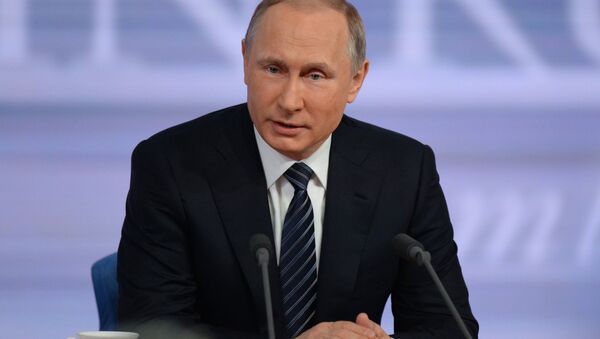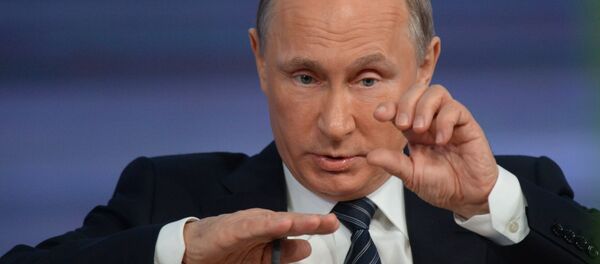On Thursday, Russian President Vladimir Putin sat down with over 1,300 journalists for the annual end-of-year presidential question and answer session. This year's press conference was Putin's 11th event, and he focused on the economy and foreign policy.
Analyzing Putin's remarks at the 3 hour plus event, Russian-American journalist and analyst Nikolas Gvosdev suggested that this year's presser was particularly important in terms of "what the Russian leader had to say about foreign policy."
"In the course of the last year, Putin has successfully re-inserted himself as an indispensable figure in global politics, and Russia as a power which cannot be ignored or sidelined." Kerry, meanwhile, made comments in the course of his visit suggesting "that US policy on Syria…is open for modifications," saying "that US goals in Syria do not include 'regime change' per se and, echoing language used by the Russians in the past, [and noting] that Syrians must decide their own future – while still including the caveat that the United States does not believe that Assad has any future in a post-conflict Syria."
The second development, Gvosdev noted, came earlier, with "the Kremlin…gratified by the decision of Italian Prime Minister Matteo Renzi to block the automatic extension of EU sanctions against Russia, forcing them to be placed on the agenda of EU leaders. While the sanctions are likely to be renewed this time, Renzi's actions signaled that a number of European states are growing tired of the sanctions and are looking for ways to modify or remove [them] altogether in 2016."
Putin's olive branches, the analyst suggested, included remarks calling for "a continued search for cooperation in the fight against terrorist organizations in the Middle East…and the first (if limited) acknowledgements that there are Russians among the separatists in Eastern Ukraine."
Asked by a combative Ukrainian journalist about the possibility of exchanging "Russian servicemen" for Ukrainian soldiers in Donbass, Putin noted only that Russia had never denied that Russian citizens, including ex-military personnel, had fought in eastern Ukraine. "But this does not mean that regular Russian troops are present there. Feel the difference," the president said.
In any case, Gvosdev suggested that given the growing "Ukraine fatigue in Western capitals" over "the apparent slow pace of reforms…Putin seems to be signaling a willingness to find a compromise on Ukraine that the West can live with, while trying to create the basis for closer cooperation over Syria –if the sticky question of Assad's immediate future can be taken off the table."
As far as the Russian president's well-publicized "endorsement" of outspoken Republican presidential candidate Donald Trump, the analyst believes that there may actually be a kernel of wisdom here as well.
"Whether or not Putin believes…that Trump could win the presidency," Gvozdev noted, his "praise of Trump reflects his contempt of much of the US political establishment. He has dealt with two US presidents who promised fundamental changes in the US-Russia relationship but who, from his perspective, were unwilling to invest serious political capital and risk the ire of established interest groups to make real changes –and who instead were always trying to square the circle between engaging Russia and continuing to support the expansion of Euro-Atlantic institutions eastward."
"The praise of Trump," the analyst suggested, "signals Putin's interest in finding Western leaders who will come to the table to bargain in good nineteenth-century style, trading spheres of influence for cooperation."





